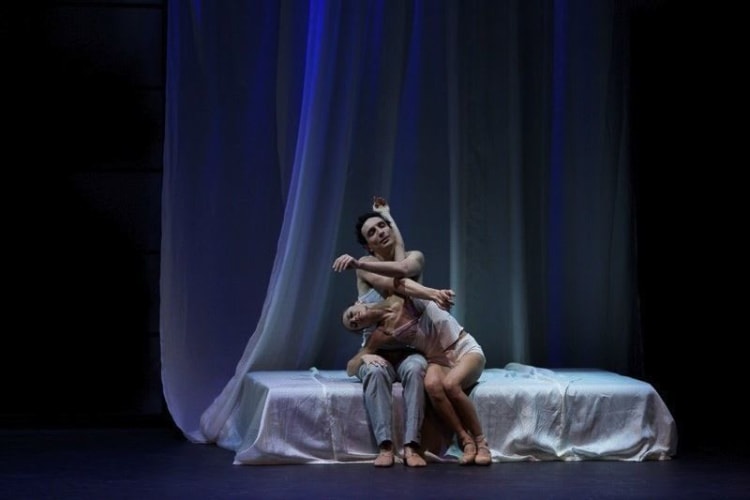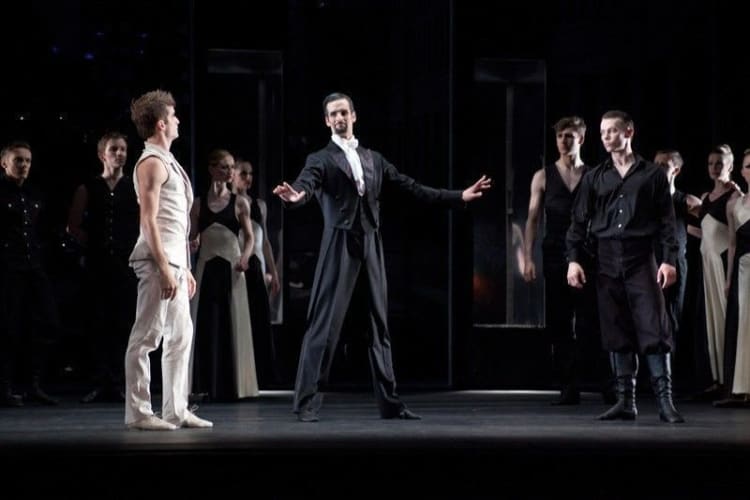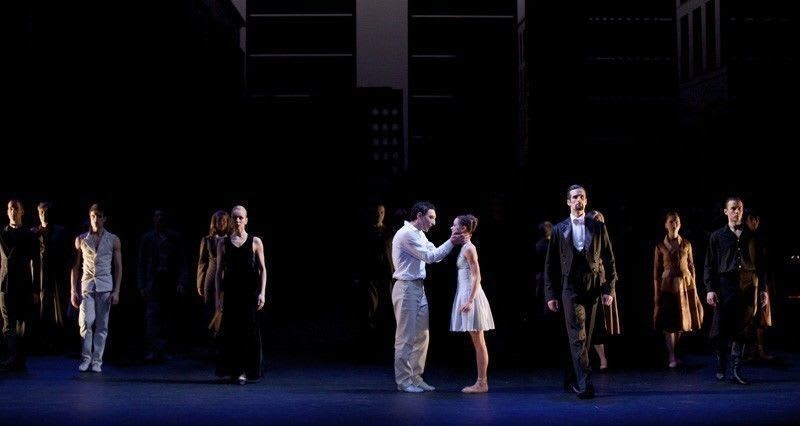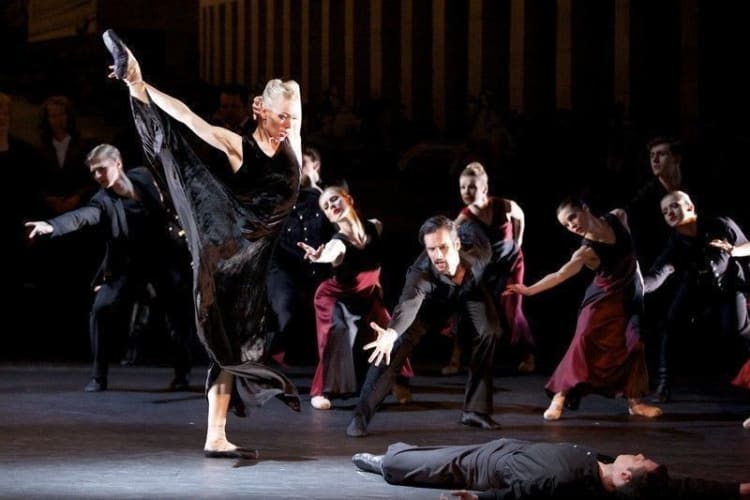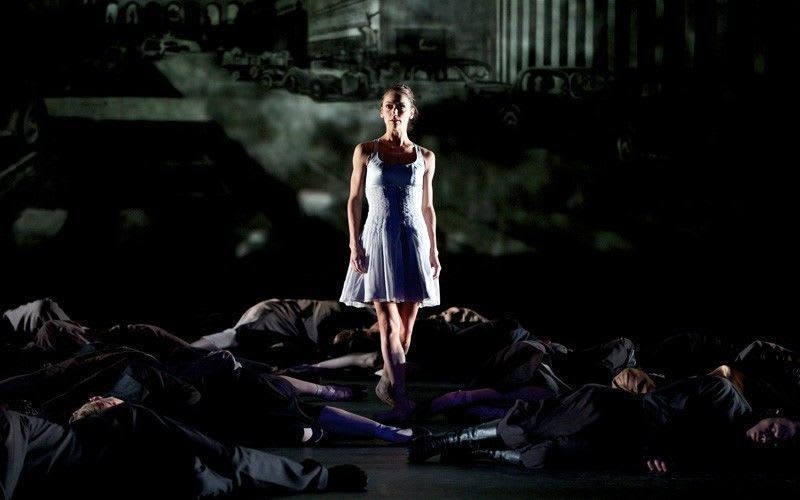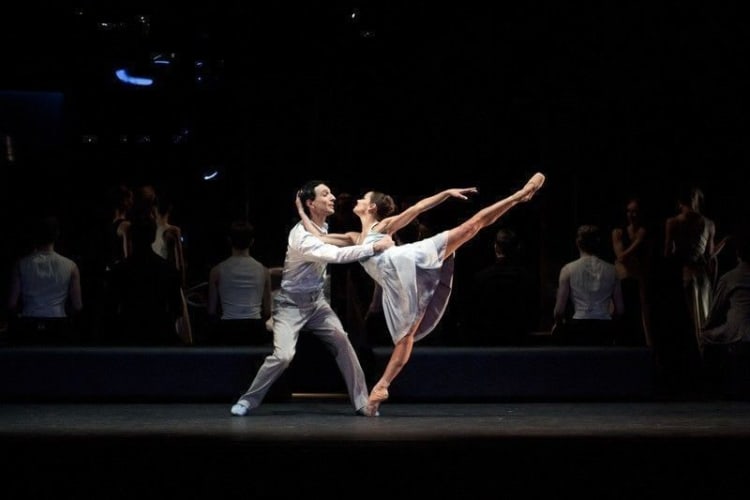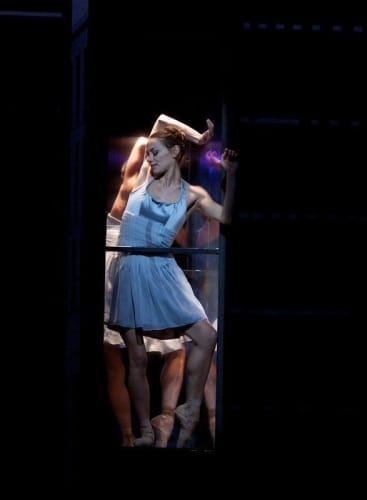Created for Scottish Ballet by Polish choreographer Krzysztof Pastor in 2008, it seems to me that it’s the context of Romeo and Juliet that interests him most of all: the internecine battles, the constant conflict bogged down in historical quagmires that poison generation after generation.
God knows, the twentieth century has seen plenty of that, and it’s in the twentieth century that Pastor places Shakespeare’s star-crossed lovers, moving from the fascist 1930s to the hopeful fifties and then to the corruption of the Berlusconi era.
Young love is a constant, it’s the background that changes, and yet nothing changes, is what I think Pastor is trying to say. And he brings the background brilliantly to the fore. His crowd scene and fight choreography outdoes the love duets hands down.
Above the Verona market scene, full of people out for their evening passeggiata, loom monochrome back projections of pristine fascist utopian architecture, the ruins of war, the corpses of battle, giving premonition of what is to come.
Opposing ideologies evident in every movement, Tybalt and Capulet black shirts in military stride are juxtaposed against the three carefree Montague friends in open-necked shirts and light suits. Antagonisms and rude gestures, leading to the inevitable…
Mercutio (Victor Zarallo so good in Streetcar Named Desire) is a buoyant force, a life spirit and a joy to watch, but not so for Christopher Harrison’s terrifically uptight Tybalt. Their kickboxing duets are fierce but are they deadly? No swords, so how will the end come?
Mercutio taunts Tybalt with a bit of homoerotic fun, but it is Juliet’s malign father who provides the means for his coup de grâce—the knife for a stab in the back.
Juliet’s parents set the tragedy rolling. The mother’s incestuous affection for Tybalt, the proprietorial father who will brook no dissention from wife or daughter—Visconti’s The Damned plays in my mind.
Blonde elegantly coiffured Eve Mutso (a memorable Blanche in Streetcar…) in sleek black gown has her moments with her daughter, but is in thrall to the menfolk in her family.
Lord Capulet dances the Dance of the Knights alone, and what a commanding presence Owen Thorne is—head and shoulders above the rest, tall, long-legged—in white tie and tails he looks even taller, a Rupert Everett lookalike not to be crossed. Energy levels rise when he is on stage, and the choreography he is given to dance is outstanding. This I’d like to see again.
Juliet has no nurse but two maids to assist her, there is no duke to break up the warring families, only the ineffectual Friar Laurence. And Paris is a gaggle of men, picked by her father, before whom Juliet is made to dance, to showcase herself.
The back projection takes on the look of a hand-tinted photograph, colour, scooters and ice cream enter the spectrum, but power is where it always is.
Roberto Rossellini’s 1945 Rome, Open City changes to Fellini’s 1953 I Vitelloni (I’m thinking of the three friends sowing their wild oats here), but the politics barely change. An odd silent television close-up of Berlusconi invades the screen montage. The Wizard of Oz my companion whispers.
Might is right, and art and power go hand in hand. Tatyana van Walsum’s black, white, and chrome minimalist set defines that with its monumental rigid architectural lines, and there’s even a lift for Juliet to descend from the balcony—here live very rich people.
The knife that dispatched Mercutio and Tybalt reappears in Romeo’s hand when he finds Juliet in faked death on the catafalque. It serves both him and Juliet—no poison for them—the poison is there in that knife that is never stilled. The mischief continues, as global newsreels tell us. And the curtain call is taken in contemporary attire.
What is missing, though, is overwhelming passion. I hear it in Prokofiev’s music played so magnificently by the Scottish Ballet Orchestra, but don’t see it in Romeo and Juliet’s pas de deux. Sophie Martin and Erik Cavallari look right and dance full out, but I fear that Pastor has put all his energies elsewhere. Emoting is not enough.
Kenneth MacMillan always choreographed pas de deux first and then filled in the background. Pastor seems to have done the reverse. His crowd scenes are vibrant, full of colour and detail, real, and the company dances them with finesse and great vitality.
The subsidiary characters are fully fleshed, too, but the leads feel like sidelined cyphers. Maybe that is the point. My heart did not break for them but for the never-ending folly of the ways of men. The lovers are separated by their families in death—no eternal union for them—division and hatred marches on.
